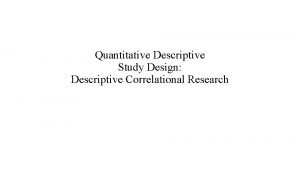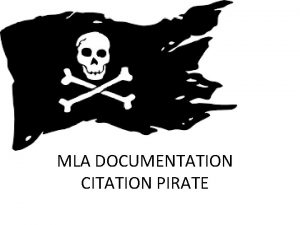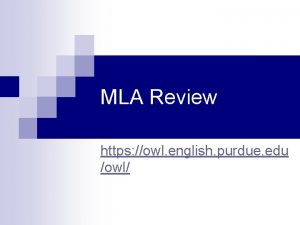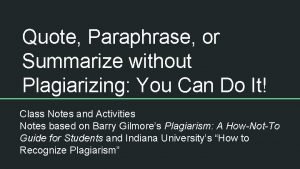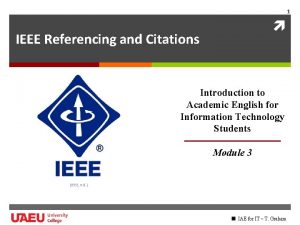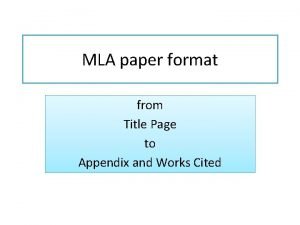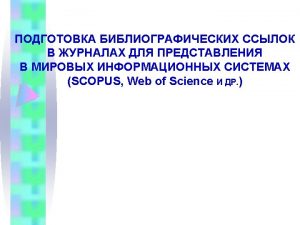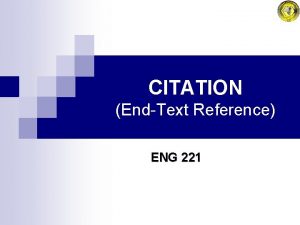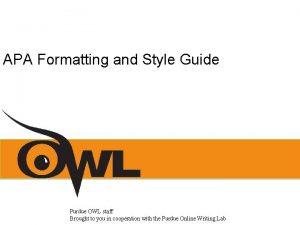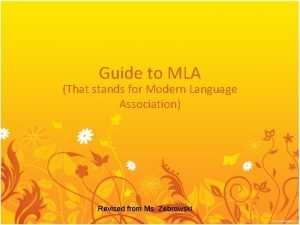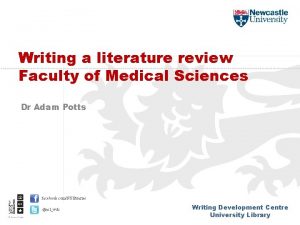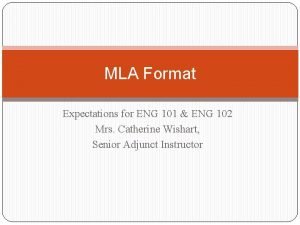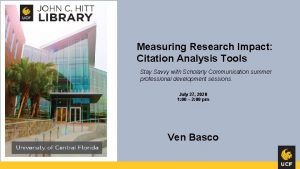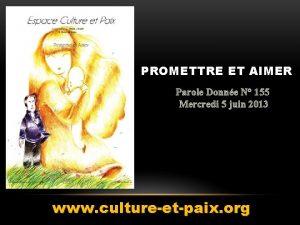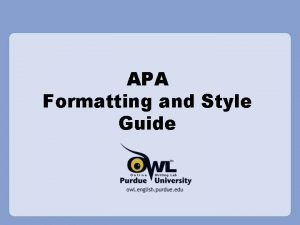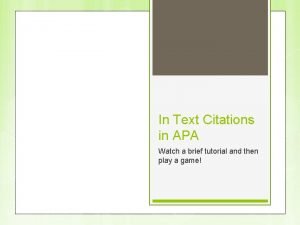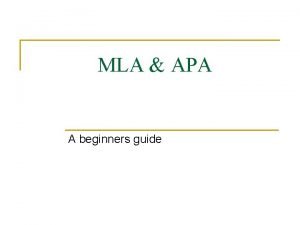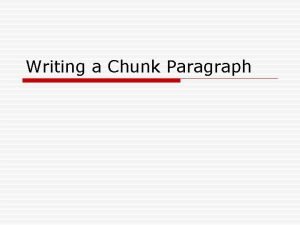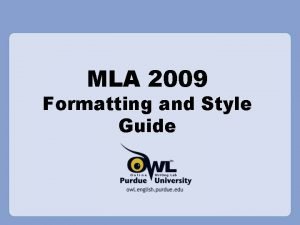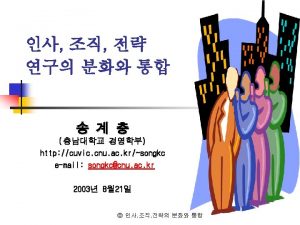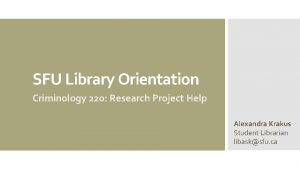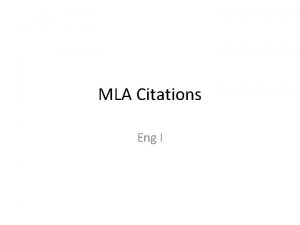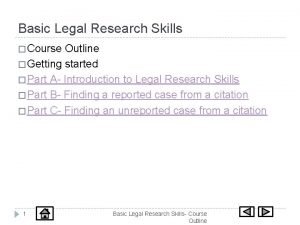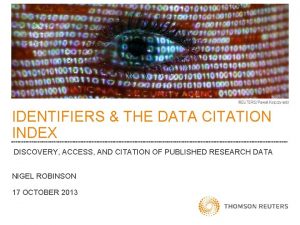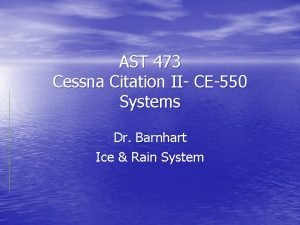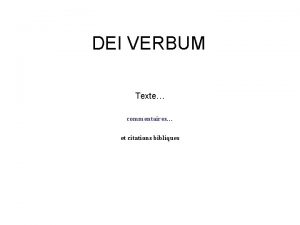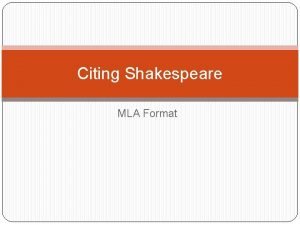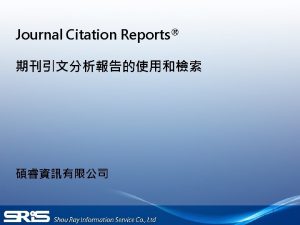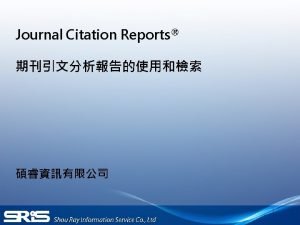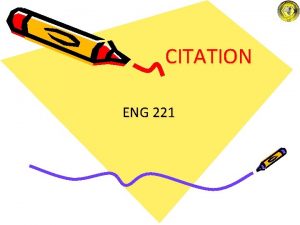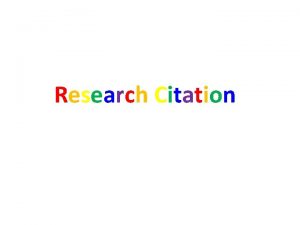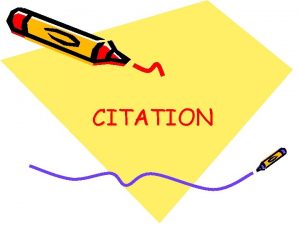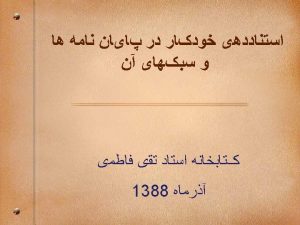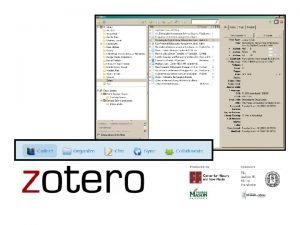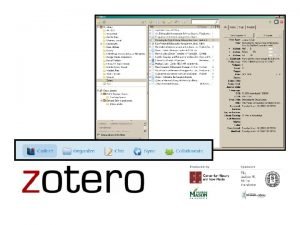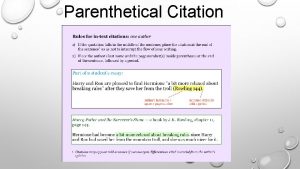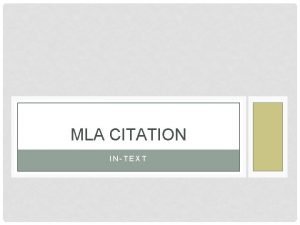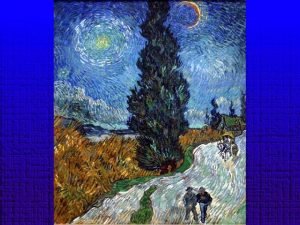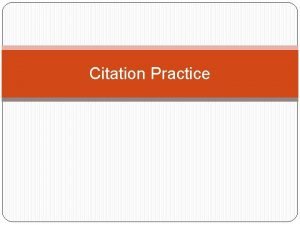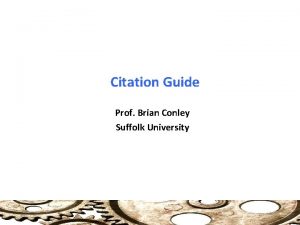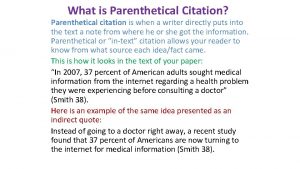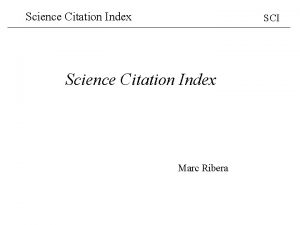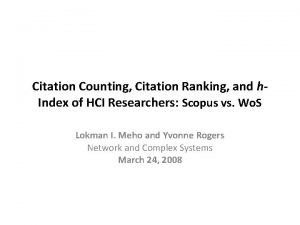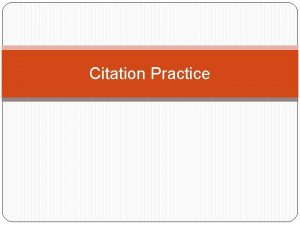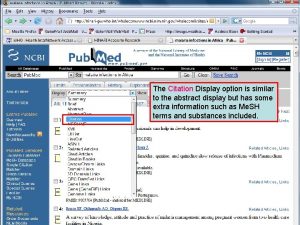CITATION What is citation Citation n 1 A









































- Slides: 41

CITATION

What is citation? • Citation (n. ) 1. A quotation from or reference to a book, paper, or author, esp. in a scholarly work CANKAYA UNIVERSITY - FOREIGN LANGUAGES- ENGLISH UNIT

• Broadly, a citation is a reference to a published or unpublished source (not always the original source). CANKAYA UNIVERSITY - FOREIGN LANGUAGES- ENGLISH UNIT

A "citation" is the way you tell your readers that certain material in your work came from another source. It also gives your readers the information necessary to find that source again, including: • information about the author • the title of the work • the name and location of the company that published your copy of the source • the date your copy was published • the page numbers of the material you are borrowing CANKAYA UNIVERSITY - FOREIGN LANGUAGES- ENGLISH UNIT

Why should I cite sources? • Giving credit to the original author by citing sources is the only way to use other people's work without plagiarizing. However, there a number of other reasons to cite sources: • Citations are extremely helpful to anyone who wants to find out more about your ideas and where they came from. CANKAYA UNIVERSITY - FOREIGN LANGUAGES- ENGLISH UNIT

Why should I cite sources? • Citing sources shows the amount of research you've done. • Citing sources strengthens your work by lending outside support to your ideas. CANKAYA UNIVERSITY - FOREIGN LANGUAGES- ENGLISH UNIT

Shortly; To show different points of view To support our ideas Why do we cite? CANKAYA UNIVERSITY - FOREIGN LANGUAGES- ENGLISH UNIT To be more credible in giving information

Definitions Quotes What do we cite? Processes Descriptions Data Research Results Statistical Information CANKAYA UNIVERSITY - FOREIGN LANGUAGES- ENGLISH UNIT

Books Journals From where do we cite? Encyclopedias Online Sources Dictionaries Theses / Dissertations CANKAYA UNIVERSITY - FOREIGN LANGUAGES- ENGLISH UNIT Online journals e-books e-references

Direct Quotation CITATION Borrowing others’ ideas by indicating the source Paraphrasing CANKAYA UNIVERSITY - FOREIGN LANGUAGES- ENGLISH UNIT Summary

How do we cite references? • In-text reference or In-text citation • End-text reference or End-text citation (These subjects will be focused on in detail. ) CANKAYA UNIVERSITY - FOREIGN LANGUAGES- ENGLISH UNIT

REMEMBER: • While you integrate sources into your essay, it should be kept in mind to give both in-text and end-text references whenever you use others’ ideas and/or research. CANKAYA UNIVERSITY - FOREIGN LANGUAGES- ENGLISH UNIT

• Not citing the borrowed ideas is academic dishonesty, which is called PLAGIARISM. CANKAYA UNIVERSITY - FOREIGN LANGUAGES- ENGLISH UNIT

What information should be cited? • • All direct quotations All paraphrases All summaries All facts and statistics that are not common knowledge • All translations CANKAYA UNIVERSITY - FOREIGN LANGUAGES- ENGLISH UNIT

COMMON KNOWLEDGE What is common knowledge? Common knowledge is knowledge that is known by everyone or nearly everyone, usually with reference to the community in which the term is used. CANKAYA UNIVERSITY - FOREIGN LANGUAGES- ENGLISH UNIT

TASK 1 Examine the following sentences and discuss which one is common knowledge and why. 1. 2. Diana died after a car crash in a road tunnel in Paris along with Dodi Al-Fayed. - Common knowledge After Lady Diana’s death, on July 6, 2004 Queen Elizabeth II officially opened the Diana, Princess of Wales Memorial Fountain designed by the architect Kathryn Gustafson. The fountain is located in Hyde Park in London. - Not common knowledge; it includes specific information that one may not be familiar with. CANKAYA UNIVERSITY - FOREIGN LANGUAGES- ENGLISH UNIT

• It can sometimes be difficult to decide what is to be cited and what is common knowledge. CANKAYA UNIVERSITY - FOREIGN LANGUAGES- ENGLISH UNIT

For example; • “China is the most crowded country in the world. ” - The above statement is common knowledge for (almost) everyone in the world. • “Süleymaniye Mosque was designed by Mimar Sinan. ” - The second statement is common knowledge for (almost) everyone in Turkey. CANKAYA UNIVERSITY - FOREIGN LANGUAGES- ENGLISH UNIT

• Therefore, what may be common knowledge in one culture – or in one specific group of people – may not be common in another. • If a paper is addressed to a certain group of people, the writer may not need to cite some pieces of information that are common knowledge for them. CANKAYA UNIVERSITY - FOREIGN LANGUAGES- ENGLISH UNIT

• However; if the same paper is intended for the non-members of the same group, the writer may need to cite the information. CANKAYA UNIVERSITY - FOREIGN LANGUAGES- ENGLISH UNIT

The best advice is. . . When in doubt, cite your source! CANKAYA UNIVERSITY - FOREIGN LANGUAGES- ENGLISH UNIT

REMEMBER! • Even if a piece of information is common knowledge, you need to cite source if you use the exact sentence! CANKAYA UNIVERSITY - FOREIGN LANGUAGES- ENGLISH UNIT

What is NOT common knowledge? • All statistics, data, figures • References to studies done by others • References to specific facts the average reader would not know about unless s/he has done research CANKAYA UNIVERSITY - FOREIGN LANGUAGES- ENGLISH UNIT

TASK 2 Identify common knowledge 1. ___ 76% of the American men sent to Vietnam were from lower-middle, working class backgrounds. 2. ___ World War II took place between the years 1939 and 1945. 3. ___ Barrack Obama is the first elected African-American president of the USA. 4. ___ Hitler was born in 20 April 1889 at the Gasthof zum Pommer. 5. ___ The 1789 French Revolution was a period of political and social upheavel in the history of France during which the French government underwent radical changes. CANKAYA UNIVERSITY - FOREIGN LANGUAGES- ENGLISH UNIT

How to cite references • In this lesson, you will study the conventions of APA style, by means of which you need to document your sources both as in-text and end-text references. CANKAYA UNIVERSITY - FOREIGN LANGUAGES- ENGLISH UNIT

APA in-text style uses the author-year method of citation. • The first citation of any work must include the author, year and, if a specific page needs to be identified, the page number of the work unless it is mentioned in the text containing the citation. • Subsequent citations to the same work need NOT include the year as long as the work can easily be distinguished from other works cited in the paper. EXAMPLE: The first time a source appears in the text: "Students often had difficulty using APA style, especially when it was their first time" (Jones, 1998, p. 199). The second or other times it appears in the text: “Students started to find APA style citation relatively easy as they get used to using it” (Jones, p. 201). CANKAYA UNIVERSITY - FOREIGN LANGUAGES- ENGLISH UNIT

BRIEF GUIDELINES for GIVING IN -TEXT REFERENCE Ø Depending on your choice, you can place the writer’s surname, the publication year and the page in different places in your sentence. CANKAYA UNIVERSITY - FOREIGN LANGUAGES- ENGLISH UNIT

Analyze different ways of giving in-text reference in the sentences below. • Several rivers aside from the Thames once intersected London, although those rivers have since been covered over by development (Clayton, 2000, p. 28). • Anthony Clayton points out that several rivers aside from the Thames once intersected London, although those rivers have since been covered over by development (2000, p. 28). Also; • Clayton (2000) points out that several rivers aside from the Thames once intersected London, although those rivers have since been covered over by development (p. 28). CANKAYA UNIVERSITY - FOREIGN LANGUAGES- ENGLISH UNIT

BRIEF GUIDELINES for GIVING IN-TEXT REFERENCE When you refer to a text with two writers, if the writers’ names are in parantheses, put an ampersand (&) between the two. However, if the writers’ names are outside the parantheses, use “and” in between. CANKAYA UNIVERSITY - FOREIGN LANGUAGES- ENGLISH UNIT

Work by two authors named in the text • Rosdahl and Weise point out that the unemployed of Denmark have had the right to request job related activities such as training or publicly supported work, but that right has recently become an obligation (2001, p. 160). Also; • Rosdahl and Weise (2001) point out that the unemployed of Denmark have had the right to request job related activities such as training or publicly supported work, but that right has recently become an obligation (p. 160). CANKAYA UNIVERSITY - FOREIGN LANGUAGES- ENGLISH UNIT

Work by two authors • The unemployed of Denmark have had the right to request job related activities such as training or publicly supported work, but that right has recently become an obligation (Rosdahl & Weise, 2001, p. 160). CANKAYA UNIVERSITY - FOREIGN LANGUAGES- ENGLISH UNIT

Work by three or more authors • Cite all authors the first time the reference occurs; Ø in subsequent citations, include only the last name of the first author followed by 'et al. ' EXAMPLE: The first time Kahneman, Knetsch, and Thaler (1991) found that. . . The second time (or other times) Kahneman et al. (1991) found that. . . *et al. = Latin; “and others” CANKAYA UNIVERSITY - FOREIGN LANGUAGES- ENGLISH UNIT

BRIEF GUIDELINES for GIVING IN-TEXT REFERENCE When you refer to source with three or more writers, you do not need to list all the surnames each time you cite the source. The first time you cite the source, list all the surnames putting an ampersand (&) before the last one. From then onwards, write only the surname of the first writer and “et al. ” which means “the others” in Latin. CANKAYA UNIVERSITY - FOREIGN LANGUAGES- ENGLISH UNIT

BRIEF GUIDELINES for GIVING IN-TEXT REFERENCE • If the source you use has no author but is the work of an organization, you can give the name of the organization instead of the writer’s surname. (UNESCO, 1999, para. 4) • If the source you use has no author, give the title in quotation marks. (“An effective Leader, ” 2000, para. 7) CANKAYA UNIVERSITY - FOREIGN LANGUAGES- ENGLISH UNIT

BRIEF GUIDELINES for GIVING IN-TEXT REFERENCE • If the information you want to borrow appears as a borrowed source in the source you have at hand, you should refer to both writers using “as cited in”. EXAMPLE: According to Viscount Slim, willpower and firmness, which are elements of determination, are the most critical characteristics for a leader (as cited in Hughes et al. , 2006, p. 15). CANKAYA UNIVERSITY - FOREIGN LANGUAGES- ENGLISH UNIT

BRIEF GUIDELINES for GIVING IN-TEXT REFERENCE • If there is no date of publication, put “n. d. ” in the place of year of publication. ( Jackson, n. d. , para. 5). • If the information is on a single page, put “p. ” before the page number. EXAMPLE: Lewis (1967) points out that following his victory in the Turkish War of Independence, there were many distractions, which at that time might have dissuaded Mustafa Kemal, a war-hero (p. 254). CANKAYA UNIVERSITY - FOREIGN LANGUAGES- ENGLISH UNIT

BRIEF GUIDELINES for GIVING IN-TEXT REFERENCE • If the information is on more than a single page, put “pp. ” and “-” between the page numbers. EXAMPLE: Kinross (1965, pp. 94 -95) points out that knowing the patriotic fighting spirit of the Turks, Mustafa Kemal knew how to arouse. . . CANKAYA UNIVERSITY - FOREIGN LANGUAGES- ENGLISH UNIT

BRIEF GUIDELINES for GIVING IN-TEXT REFERENCE • If there is no page number, indicate the paragraph number with either “para. ” or the symbol “ ” EXAMPLE: In his article “Atatürk in His Lifetime and Today”, Mango (2000) explains, as one of the Turkish biographers put it, the basic ideas, the new ideas came from Atatürk, their implementation he left to others (para. 3). OR In his article “Atatürk in His Lifetime and Today”, Mango (2000) explains, as one of the Turkish biographers put it, the basic ideas, the new ideas came from Atatürk, their implementation he left to others ( 3) CANKAYA UNIVERSITY - FOREIGN LANGUAGES- ENGLISH UNIT

Indirect quotations v Use this form to cite a quotation that was found in another (not the original) source. For example; • John Evelyn described London's churchyards as being filled with bodies "one above the other, to the very top of the walls, and some above the walls" (qtd. in Clayton, p. 14). CANKAYA UNIVERSITY - FOREIGN LANGUAGES- ENGLISH UNIT

Electronic and Multimedia Sources v Electronic sources are cited in the typical author-page number style with one difference: when an Internet site does not have page numbers, offer other location information such as screen, section (sec. ), paragraph (para. ), track, or time frame (minute). For example: • Because of Greece's physical characteristics-its jagged coast made almost all settlements within 40 miles of the sea-the ancient Greeks relied on the sea for most long-distance traveling (Martin, 2002, sec. 2. 4). CANKAYA UNIVERSITY - FOREIGN LANGUAGES- ENGLISH UNIT

Although it is beneficial to know the basics of referencing. . . You do not need to remember all these. Always check by writing APA referencing guide on www. google. com CANKAYA UNIVERSITY - FOREIGN LANGUAGES- ENGLISH UNIT
 Citation
Citation Scribbr referencing
Scribbr referencing Descriptive correlation research
Descriptive correlation research How to cite romeo and juliet
How to cite romeo and juliet How i became a pirate mla citation
How i became a pirate mla citation Owl purdue
Owl purdue How to summarize without plagiarizing
How to summarize without plagiarizing Quotation sandwich examples
Quotation sandwich examples Vol de nuit citation
Vol de nuit citation Apa vs ieee
Apa vs ieee Example of appendix in research
Example of appendix in research Apa 5
Apa 5 End-text citation example
End-text citation example Noodletools mla lite
Noodletools mla lite Purdue owl apa
Purdue owl apa Example of internal citation
Example of internal citation Mla stands for
Mla stands for Example of integral citation
Example of integral citation Aristotle poetics mla citation
Aristotle poetics mla citation Citation analysis tools
Citation analysis tools Jama citation machine
Jama citation machine La promesse 155
La promesse 155 Et al in text citation
Et al in text citation Khalil gibran citation
Khalil gibran citation Wrong citation
Wrong citation Apa for beginners
Apa for beginners One chunk paragraph format
One chunk paragraph format Rephrasing someone else’s ideas without citation.
Rephrasing someone else’s ideas without citation. How to cite multiple authors
How to cite multiple authors Nasw code of ethics apa citation
Nasw code of ethics apa citation In text citation 2 authors
In text citation 2 authors Social science citation index journal list
Social science citation index journal list Apa citation sfu
Apa citation sfu Of mice and men mla citation
Of mice and men mla citation Legal research outline
Legal research outline Data citation index
Data citation index Cessna citation de ice boots
Cessna citation de ice boots Ice writing method
Ice writing method Encoding and decoding stuart hall
Encoding and decoding stuart hall Document author
Document author Dei verbum 12
Dei verbum 12 How to cite shakespeare in mla
How to cite shakespeare in mla


